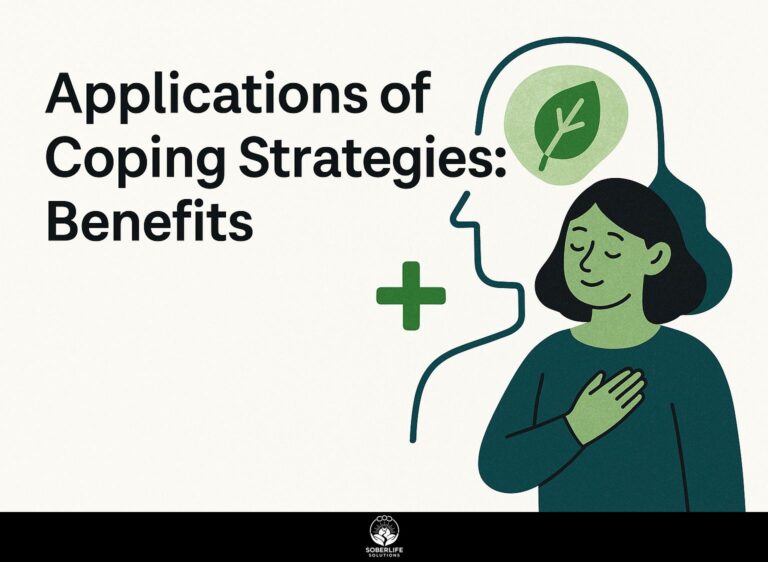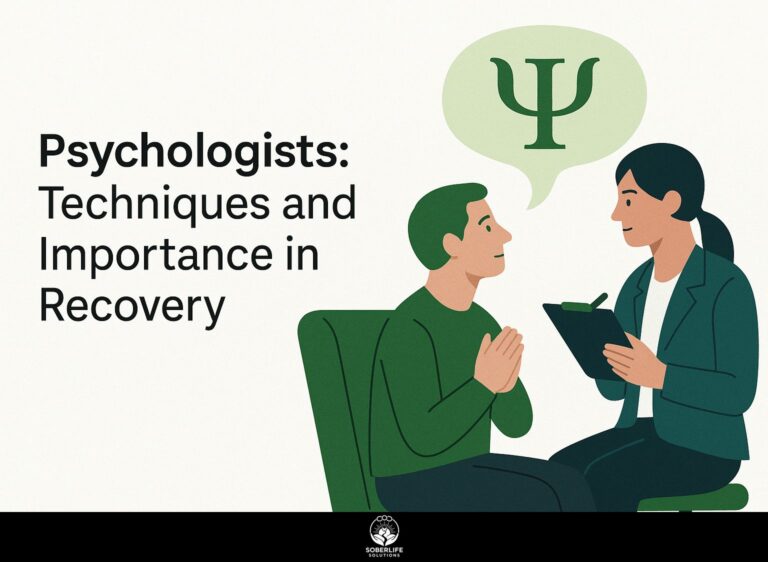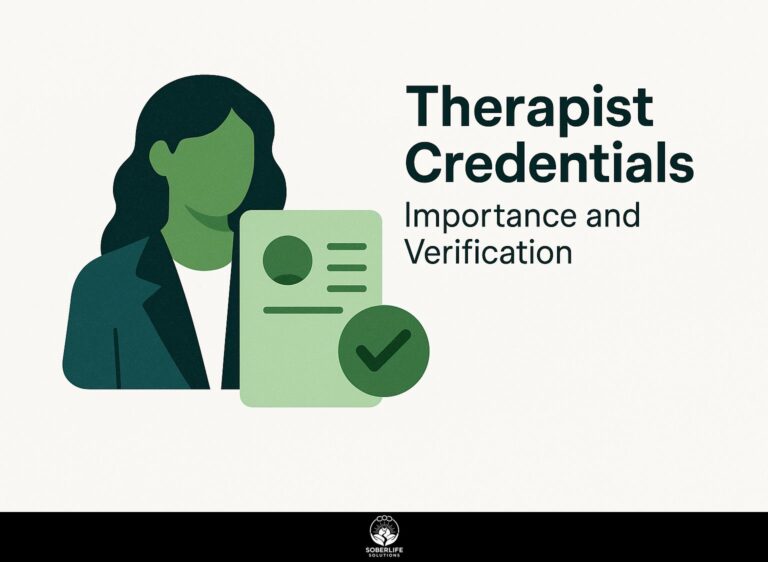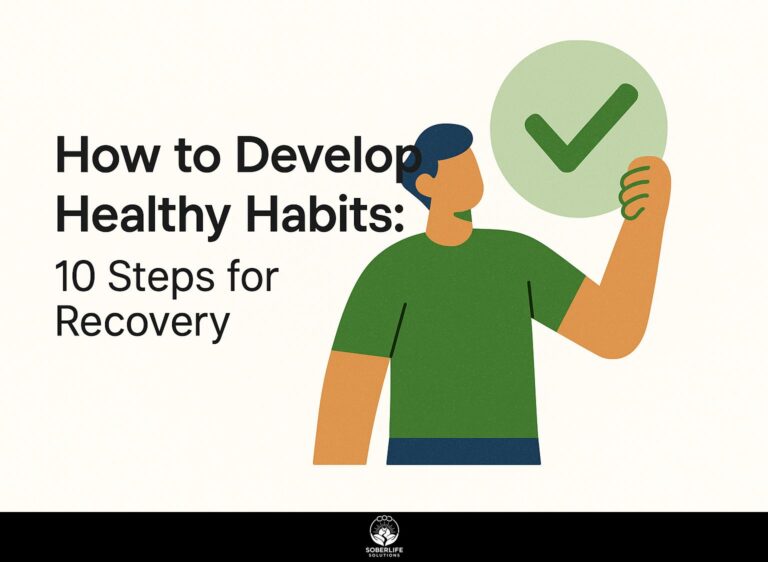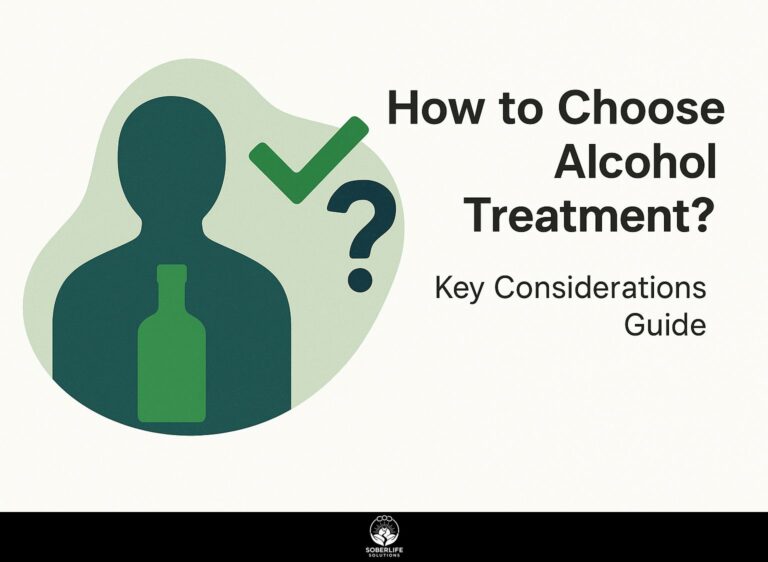Mindfulness in Alcoholism: Techniques and Recovery Strategies
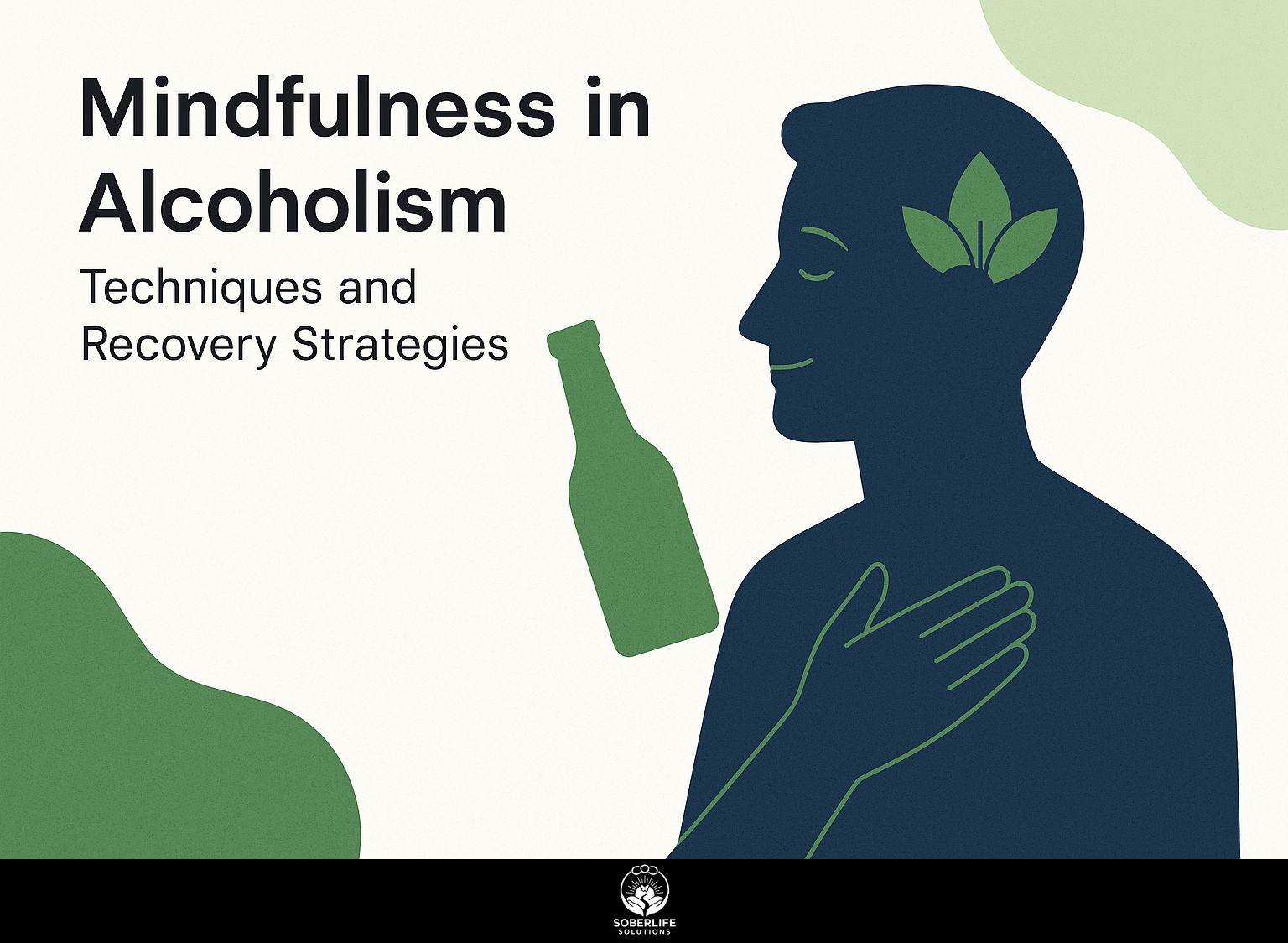
Struggling with alcoholism often leads to a cycle of addiction that weighs heavily on mental health. Mindfulness, especially through therapy that focuses on mindfulness, provides useful methods to stop this cycle. This article discusses practical mindfulness techniques for healing, showing how they can improve control over emotions and help with permanent transformation. Learn how adding mindfulness to your daily routine can change the way you handle addiction and support better mental health.
Key Takeaways:
Understanding Alcoholism
Alcoholism is characterized by a compulsive pattern of alcohol use leading to significant impairment in daily functioning, impacting mental health and relationships.
Symptoms of alcoholism can include cravings for alcohol, loss of control over drinking, and withdrawal symptoms such as anxiety or tremors.
According to the National Institute on Alcohol Abuse and Alcoholism, in 2019, around 14.5 million adults were diagnosed with Alcohol Use Disorder, highlighting the widespread nature of the issue.
Treatment options include cognitive-behavioral therapy, medication like naltrexone, and support groups such as Alcoholics Anonymous. Another effective strategy involves developing coping mechanisms for alcoholism recovery.
Together, these methods help people take back control of their lives and develop better ways to handle challenges. In fact, the CDC reports that excessive alcohol use is responsible for numerous health issues and deaths annually, underscoring the importance of effective treatment strategies.
The Role of Mindfulness
Mindfulness practices, popularized by figures like Jon Kabat-Zinn and Thich Nhat Hanh, serve as effective therapeutic tools in the recovery from alcoholism.
Research indicates that incorporating mindfulness-based therapies can significantly reduce relapse rates, showing decreases by up to 50%. Techniques like mindful breathing or guided meditations help individuals recognize and detach from cravings, allowing for more conscious responses. Related insight: How to Stay Busy: Activities to Prevent Relapse.
Mobile apps like Headspace and Calm help with daily practice by offering organized sessions specifically for addiction recovery. Practicing mindfulness increases awareness of thoughts and emotions, which helps control the emotions important for handling cravings connected to alcohol use.
Mindfulness Techniques for Recovery
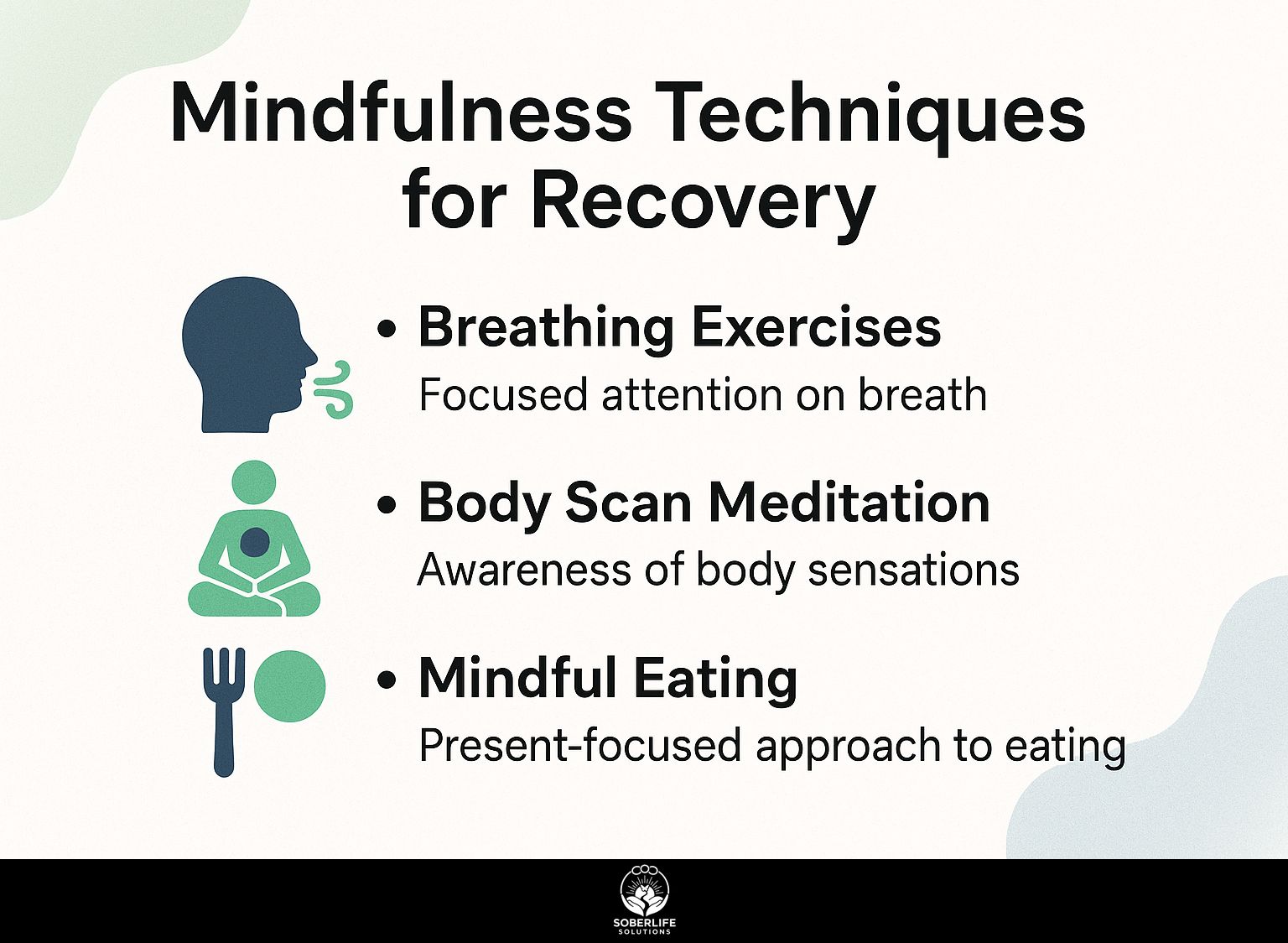
Using certain mindfulness methods can greatly improve recovery plans for people dealing with alcoholism, promoting better emotional awareness and healthier ways to handle stress. For those interested in enhancing their recovery journey, understanding healthy strategies to manage stress and emotions can be incredibly beneficial.
Breathing Exercises
Deep breathing exercises can reduce stress and cravings, providing a simple yet effective tool for individuals in recovery from alcoholism.
One effective technique is the 4-7-8 breathing method. To practice, inhale quietly through your nose for 4 seconds, hold your breath for 7 seconds, and exhale fully through your mouth for 8 seconds.
During cravings, take a moment to engage in this practice; it can help ground you and reduce immediate anxiety. Aim for at least 10 minutes of focused breathing each day, perhaps in the morning or before bed.
As time goes on, this technique can play an important role in your plan for handling stress.
Body Scan Meditation
Body scan meditation helps people become more aware of their emotions and stay focused on the present, which is very important for those recovering from addiction.
To practice body scan meditation effectively, try using guided sessions available on apps like Headspace or Insight Timer. These sessions usually take at least 20 minutes.
Start by finding a quiet space and lie down comfortably. Follow the guided voice as it helps you focus on each part of your body, from head to toe. For additional resources, UCLA Mindful offers a variety of guided meditations that can enhance your practice.
This mindful attention can reveal emotional triggers and stress points that might lead to cravings for alcohol, allowing greater self-awareness and coping strategies. Regular practice might help build strength against such urges.
Mindful Eating
Mindful eating encourages individuals to develop a healthier relationship with food, which can be particularly beneficial in the recovery process from alcoholism.
To practice mindful eating, start by focusing on the sensory experiences of your food-notice the colors, textures, and aromas. Avoid distractions like phones or television; instead, sit at a table and truly engage with your meal.
Chew slowly and savor each bite, aiming to eat until you’re 80% full. Writing down your emotions and reasons related to eating and drinking can help you understand yourself better.
For instance, note when cravings arise and what emotions accompany them, helping you identify patterns and develop healthier coping strategies.
Integrating Mindfulness into Daily Life
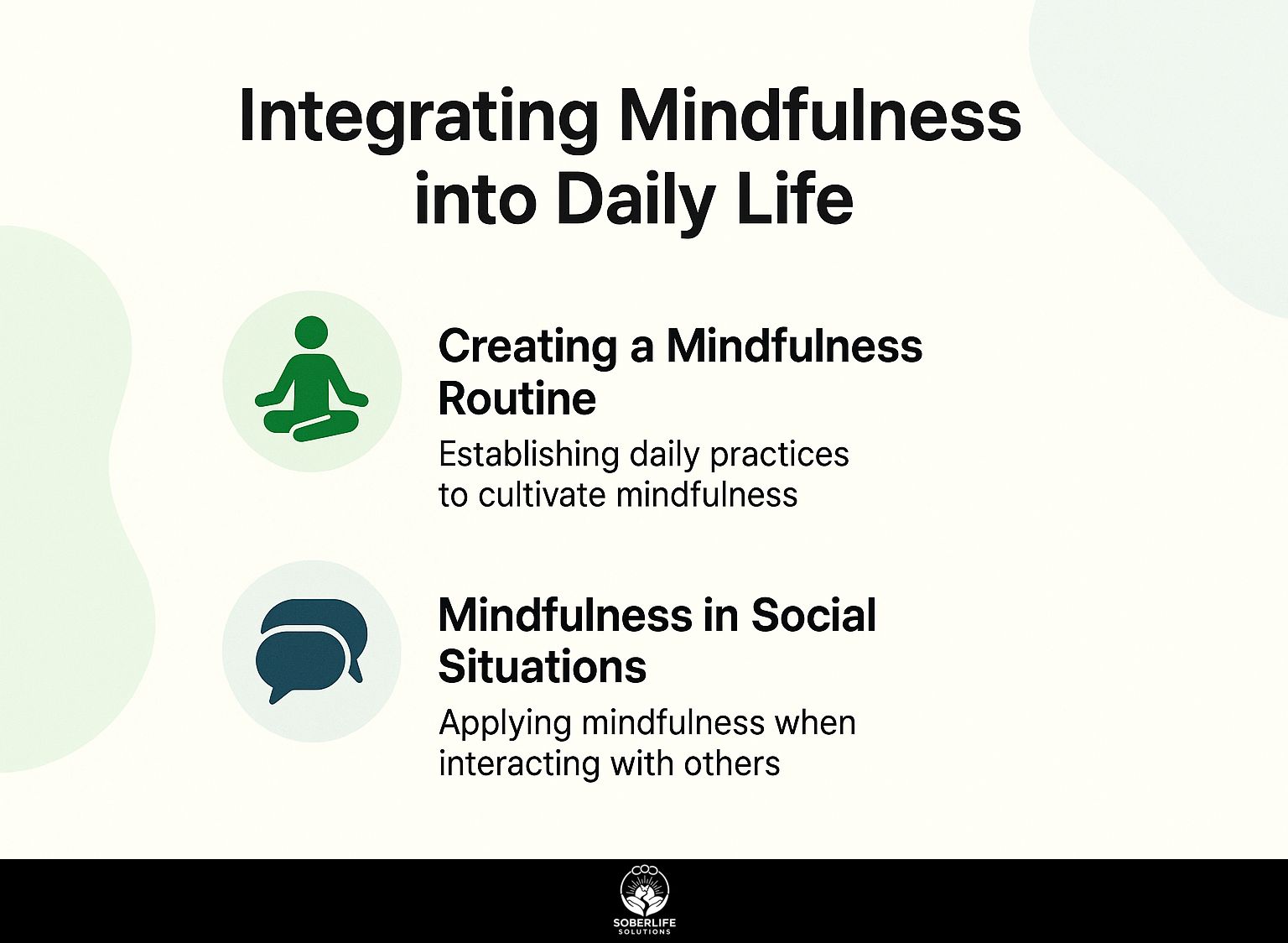
Regularly practicing mindfulness can significantly support recovery from alcoholism by integrating mindfulness into daily routines. Curious about how these strategies enhance recovery? Our resources provide comprehensive insights into effective coping mechanisms.
Creating a Mindfulness Routine
Creating a daily habit of mindfulness can be important for beating addiction and improving mental health and emotional strength.
To create your mindfulness routine, start with 5-10 minutes of guided meditation daily. Apps like Headspace or Calm can help, providing structured practices suited for beginners.
Schedule specific times for your sessions, perhaps in the morning or during lunch breaks, and stick to this schedule for consistency. Use alerts on apps like Todoist to inform you at those times.
Track your progress in a journal or an app to reflect on how mindfulness impacts your mood and cravings, reinforcing your commitment.
Mindfulness in Social Situations
Being mindful in social settings can help people handle challenges and improve how they interact with others.
To develop mindfulness, begin by focusing on listening carefully. This means paying close attention to the speaker, recognizing what they say, and replying carefully, which helps build stronger connections.
Use the Serenity Prayer to focus your mind, especially when dealing with stressful conversations.
Before going to social events, decide on specific goals-like being open to different views or working on being patient.
Engage in role-playing exercises with peers; this builds confidence and prepares you for challenging conversations, ensuring you’re better equipped to respond mindfully when social situations arise.
Benefits of Mindfulness in Alcoholism Recovery
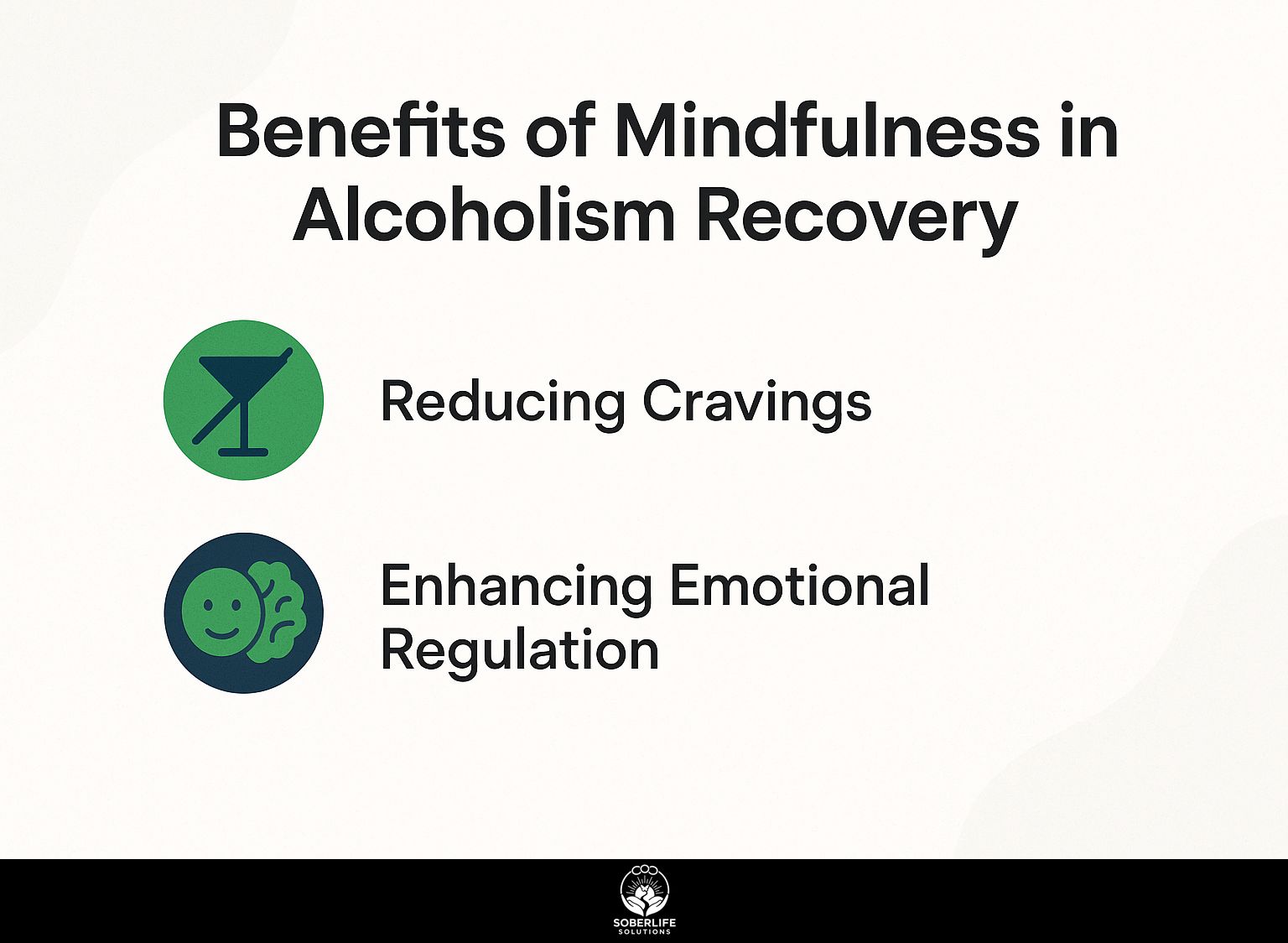
Including mindfulness in alcoholism recovery offers many advantages, such as better control over emotions and reduced cravings.
Reducing Cravings
Mindfulness practices have been shown to significantly reduce cravings for alcohol, allowing individuals to make more conscious choices about their consumption.
A study revealed that 80% of participants who engaged in mindfulness techniques reported a reduction in cravings.
To apply this in daily life, consider utilizing Mindfulness-Based Stress Reduction (MBSR) during high-risk situations. For instance, when faced with triggers, take a moment to practice deep breathing, focusing solely on your breath for a few minutes.
Writing about your cravings can help you notice patterns and emotional reasons, leading to greater awareness and control over your urges.
Enhancing Emotional Regulation
Mindfulness helps people manage their emotions by increasing their awareness of what triggers their feelings and how they respond, which is important for avoiding relapse.
Using acceptance and commitment therapy (ACT) techniques can greatly improve emotional stability. As detailed by WebMD, ACT involves daily mindfulness exercises such as a 10-minute body scan to identify how emotions manifest physically.
Use journaling to reflect on triggers and emotional responses, encouraging healthy expression. Committing to values-based actions helps align daily activities with your core beliefs, giving emotions a purposeful outlet.
For example, spend one hour each week doing volunteer work or take part in a hobby that aligns with your beliefs. These practices build strength and help manage emotions over time.
Challenges and Solutions
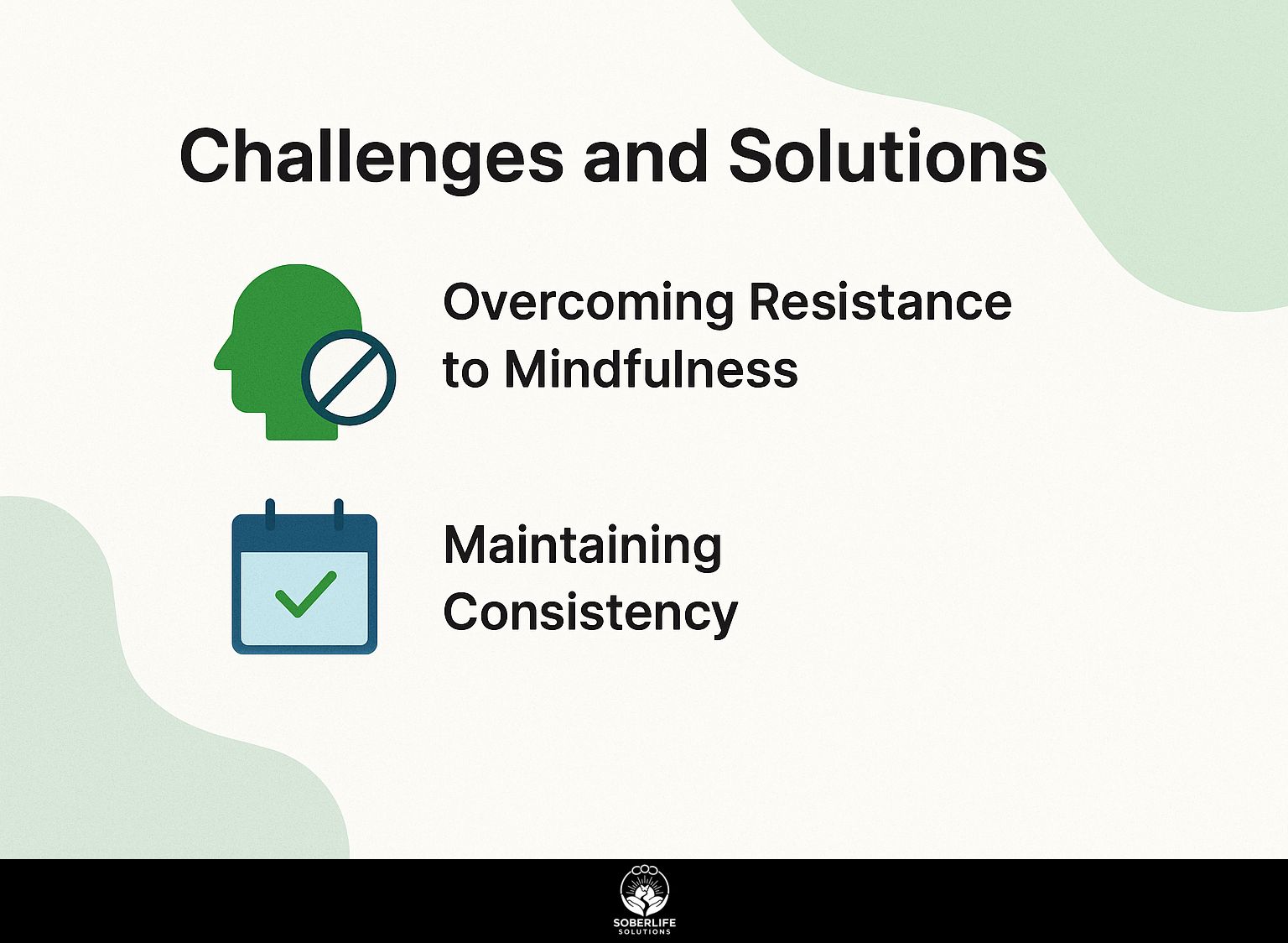
Even though it is helpful, adding mindfulness to recovery plans can be difficult and needs active methods to deal with pushback. One effective approach is to understand how mindfulness fits within the broader spectrum of therapies and supports. This aligns with the principles outlined in our analysis of Therapies for Recovery: Process and Impact Explained.
Overcoming Resistance to Mindfulness
People might resist mindfulness because they’re doubtful or uneasy about self-reflection, but there are ways to encourage them to try these practices.
To overcome this resistance, start by educating individuals on the benefits of mindfulness, such as reduced stress and improved focus.
Encourage them to begin with 5-minute daily practices, like deep breathing or guided meditation using apps like Headspace or Calm.
Joining support groups can also be beneficial; for instance, the University of Wisconsin offers resources and community gatherings.
Sharing stories from people who have seen big changes can show the benefits and encourage others to get involved.
Maintaining Consistency
Sticking with mindfulness practices is important for recovery to work well over time. This needs careful planning and help.
To improve your consistency, think about adding specific methods to your daily routine.
Habit-tracking apps like Habitica can make your mindfulness routines fun by turning them into a game. Setting daily alerts on your phone will encourage you to practice at the same time each day, helping to create a routine.
Finding an accountability partner can provide motivation and mutual support. Studies indicate that organized methods support 60% of people in continuing their recovery, highlighting the value of these practical actions in preserving your mindfulness practice.
Frequently Asked Questions
What is mindfulness and how can it help with alcoholism recovery?
Mindfulness is the practice of being fully present and aware in the current moment. It can help with alcoholism recovery by increasing self-awareness, reducing stress and cravings, and promoting healthier coping strategies.
What are some techniques for incorporating mindfulness in alcoholism recovery?
Some techniques include deep breathing exercises, meditation, and body scans. Other strategies include being mindful of triggers and cravings, practicing gratitude and self-compassion, and using non-judgmental awareness of thoughts and emotions.
Can mindfulness be used in conjunction with other treatment methods for alcoholism?
Yes, mindfulness can be combined with other treatment methods such as therapy, support groups, and medication. It can improve the effectiveness of these treatments and help maintain overall health during recovery.
How can mindfulness help prevent relapse in alcoholism recovery?
By practicing mindfulness, individuals can learn to identify and manage triggers and cravings, reduce stress and anxiety, and develop healthier coping strategies. This can help prevent relapse by promoting a more mindful and intentional approach to managing thoughts, emotions, and behaviors related to alcohol use.
Is mindfulness only beneficial for those struggling with alcoholism?
No, mindfulness can benefit anyone, regardless of their struggles or challenges. It can promote overall well-being, reduce stress and anxiety, and improve self-awareness and self-regulation. Though it is useful for recovering from alcoholism, it can also be a part of everyday routines for general health and well-being.
How can I learn more about mindfulness in alcoholism recovery?
There are many resources available for learning about mindfulness in alcoholism recovery, including books, online courses, and support groups. Find a reliable source and get advice from a qualified expert to correctly learn and use mindfulness techniques.

